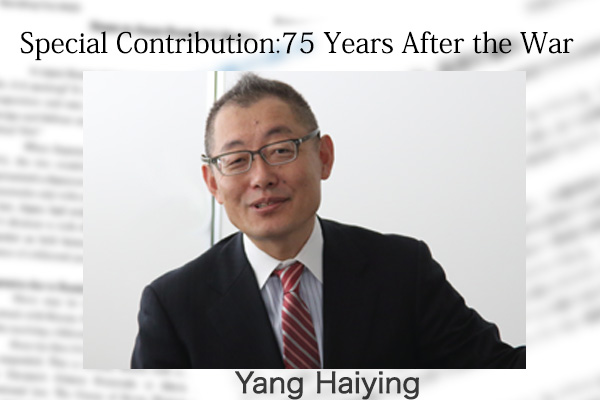August 11, 2020
What Japan should seek a three-quarter century after World War II is to break away from the Yalta system, a framework for postwar international order including the treatment of Japan based on a secret agreement reached between the United States, the United Kingdom and the Soviet Union at their conference in Yalta on the Crimea Peninsula in February 1945. Given that the Yalta agreement was a secret pact and that some countries subjected to the system were not represented in the conference, I would note that the Yalta system runs counter to international law.
Mongolia divided under Yalta
Despite its absence from the Yalta conference, Japan was subjected to the system, being forced to hand over the four northern islands, its inherent territories, to the Soviet Union. This was an unreasonable treatment for a defeated country.
Another country subjected to the Yalta system was Mongolia among the victorious countries. The country is geographically divided by the Gobi Desert into southern and northern parts. Although Mongolia became independent from China’s Qing Dynasty in 1911, Northern Mongolia was put into the Russian sphere of influence and Southern Mongolia into the Japanese sphere. Later, Southern Mongolia became part of Manchukuo and the Mongolia autonomous region (or Mengjiang) and followed the Japanese-type modernization path. Northern Mongolia made nation-building efforts with support from Russia or the Soviet Union under the Western model. The two Mongolias shared the vision of a unified Mongolia and struggled to realize the vision.
An opportunity to do so came in August 1945. Northern Mongolia, or the Mongolian People’s Republic, cooperated with the Soviet Union in penetrating into Southern Mongolia and Manchuria, liberalizing Mongolians from the Japanese and Chinese rule. A Mongolian government delegation entered Southern Mongolia along with military forces and launched reconstruction efforts while leading local people. Then came the revelation of the secret Yalta agreement to divide Mongolians as at present.
Postwar Japan quickly revived itself, becoming an industrial power. Southern Mongolia for its part has been left as a Chinese colony. People there have economically exploited, with nomadic civilization diminished. Tens of thousands of intellectuals and military officers nurtured under the Japanese rule were cruelly purged for cooperation with Japan.
Engage with former sphere of influence
Seventy five years after the devastating defeat, Japan has now emerged as a Free World leader. Japan should recognize that the time has come to not only take back the four northern islands lost under the Yalta Agreement but also proactively engage with people in its former colonies and sphere of influence.
Colonies should not satisfy themselves with a mere independence from their rulers. There are many things to learn through interaction with the colonial masters about how modern nations should be. Taiwan, with which Japan had maintained diplomatic relations over a long time, has become a model nation in Asia. France and Britain have proactively engaged with their former colonies, contributing to their democratization and economic development.
Mongolians, Tibetans and Uighurs have never seen Japan or Western countries as enemies but pursued their self-determination goal of independence from the old empire of China. The goal has not been accomplished yet. Japan and the world are liable to help these people. It is time for Japan to amend its constitution and contribute to building new international order. It should not miss the opportunity.
Yang Haiying, also known as Akira Ohno, is an author and a professor at Shizuoka University. He is from Southern Mongolia and naturalized in Japan.


